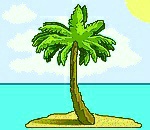
 |
itsislandtime > Grenada > Grenada Information | |
| itsislandtime.com | ||
|
Grenada |
|||||||||||
By Beachcomber, retrieved from Wikipedia Nov 2, 2003, 22:00 Grenada, an island nation in the Caribbean Sea including the southern Grenadines, is the second smallest independent country in the Western Hemisphere (after Saint Kitts and Nevis). It is located in the southeastern part of the sea, north of Trinidad and Tobago, and south of Saint Vincent and the Grenadines.
The recorded history of Grenada begins in 1498, when Christopher Columbus first sighted the island. After a failed British settlement attempt, the French purchased the island from the Carib indians in 1650. The island was again ceded to Britain in 1783. Grenada was made a Crown Colony in 1877. Independence was granted in 1974, and in 1979, after an unstable political period, power was seized by the charismatic and popular left-wing leader Maurice Bishop. Bishop's socialism and cooperation with Communist Cuba didn't sit well with the more conservative nations in the area, including Barbados, Dominica and the United States. A dispute with a hard-line Communist wing of the ruling New Jewel party loyal to Bernard Coard led to Bishop's execution on October 19, 1983 in a coup d'etat. Six days later, the island was invaded by US forces and those of six other Caribbean nations in part of a military campaign called Operation Urgent Fury. The forces quickly captured the ringleaders and their hundreds of Cuban advisers, most of whom were laborers working on the construction of a major airport for the island which the United States completed years later. Elections were held the following year. A publicised tactical concern of the United States was the safe recovery of U.S. nationals enrolled at St. George's University. In September 2004 the island was directly hit by Hurricane Ivan. The category 5 hurricane caused 90 percent of the homes to be damaged or destroyed.
As a Commonwealth nation, the British monarch is the formal head of state of Grenada. She is represented by a governor general, but real executive power lies with the head of government, the prime minister. Although appointed by the governor general, the prime minister generally is the leader of the largest faction in the parliament. The parliament consists of a Senate (13 members) and a House of Representatives (15). The senators are appointed by the government and the opposition, while the representatives are elected by the population for 5-year terms. With 49.9% of the votes and 8 seats in the 2003 election, the New National Party remains the largest party in Grenada. The largest opposition party is the National Democratic Congress with 45.1 of the votes and 7 seats.
Politically, Grenada is divided into six parishes, viz.:
The island Grenada itself is the largest island; smaller Grenadines are Carriacou, Petit Martinique, Rhonde Island, Caille Island, Diamond Island, Large Island, Saline Island and Frigate Island. Most of the population lives on Grenada itself, and major towns there include the capital St. George's, Grenville and Gouyave. Largest settlement on the other islands is Hillsborough on Carriacou. The islands are of volcanic origin, and Grenada's inlands are slightly mountainous, with several small rivers flowing into the sea. The climate is tropical: hot and humid, and Grenada occasionally suffers from hurricanes. The most recent storm to hit was Hurricane Ivan in September 2004.
Economic progress in fiscal reforms and prudent macroeconomic management have boosted annual growth to 5%-6% in 1998-99; the increase in economic activity has been led by construction and trade. Tourist facilities are being expanded; tourism is the leading foreign exchange earner. Major short-term concerns are the rising fiscal deficit and the deterioration in the external account balance. Grenada shares a common central bank and a common currency with seven other members of the Organization of Eastern Caribbean States (OECS).
About 80% of the population are descendants of the African slaves brought by the Europeans; very little of the indigenous Carib and Arawak population remains. The official language, English, is spoken by virtually everyone, although a few still speak a French patois. Nearly all Grenadians are Christians, about half of them Catholics; Anglicanism is the largest Protestant religion.
French influence on culture is much less than in other Caribbean islands, and culture is heavily influenced by the African roots of most of the Grenadians. Click here for the full Wikipedia article.
|